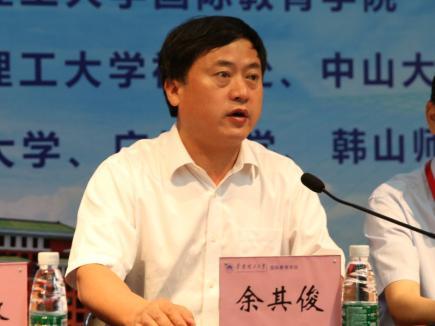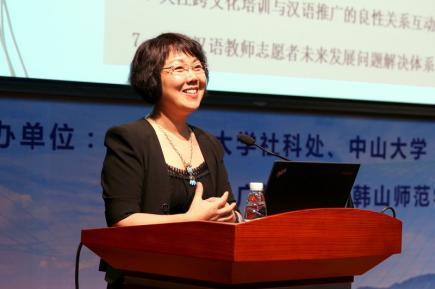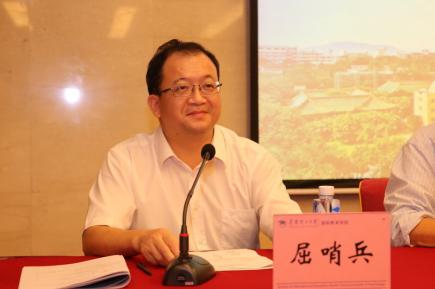 |
| 广东省中国语言学会2014-2015学术年会在华南理工大学顺利召开 |
| 发布时间: 2015-11-24 浏览次数: 492 |
|
2015年11月21日至22日,由广东省中国语言学会主办,广东省公共外交与跨文化传播研究基地、华南理工大学国际教育学院承办,华南理工大学社科处、中山大学、暨南大学、广州大学、韩山师范学院协办的“广东省中国语言学会2014-2015学术年会”在华南理工大学大学城校区顺利召开。北京市语言学会会长、北京语言大学校长崔希亮教授,上海市语言学会会长、华东师范大学胡范铸教授,香港特别行政区原语言学会会长、香港理工大学石定栩教授,广东省中国语言学会会长、暨南大学特聘一级教授邵敬敏教授,广东省中国语言学会副会长、广州市教育局局长屈哨兵教授等出席年会,来自华南理工大学、中山大学、暨南大学、华南师范大学、深圳大学、广州大学等省内20多所高校的100余名专家学者参加本次年会。
开幕式由屈哨兵副会长主持,广东省中国语言学会会长、暨南大学特聘一级教授邵敬敏教授首先致辞。他指出,广东省中国语言学会成立三十多年来,始终如一地坚持学术研究,坚持学术交流,积极开展各类学术活动,优秀成果不断涌现,除了与各位会员的支持与理解分不开以外,也体现了学会团结和谐、有学术活力、活动丰富多彩、心态开放的鲜明特色。邵敬敏教授表示,学会发展壮大至今,不仅在广东省内颇具影响,也为京沪港粤语言学会的交流提供了良好的平台。他相信,学会会越办越兴旺,队伍会越来越壮大。 华南理工大学党委副书记余其俊在讲话中谈到,语言作为人类认识、理解、参与和改变世界的重要符号系统,在社会生活和国际交往中具有不可替代的重要作用。当前,中国正以前所未有的程度参与和融入全球化进程,中国语言学研究也受到越来越多的关注和重视。广东省中国语言学会自1983年成立以来,积极开展了许多卓有成效的工作,不仅促进了中国语言学的发展,也增进了中国与世界其他各国的交流与合作。余书记希望此次年会能为促进中国语言学研究、加强中外语言文化交流合作搭建优秀的工作平台,分享成果,共谋发展。 名誉会长詹伯慧教授致辞 京沪港语言学会会长致辞 名誉会长詹伯慧教授在致辞中,以“执着”为主题,谈到在广东省中国语言学会成立、发展的历程中,最可贵的精神在于坚持、执着、继往开来,他指出,未来中国语言学发展的天地更为宽广,希望各位同仁共同努力,将旗帜继续传递下去。学术委员会主任唐钰明教授着重谈了“包容”,他认为,广东省中国语言学会的学术气氛强,学术思想活跃,这是很好的传统,希望学会能继续保持兼容性、开放性。崔希亮教授首先代表北京市语言学会和北京语言大学对年会的召开表示祝贺,接着谈了“发展”,他以这次习近平主席访问英国为例,指出中国地位已发生了变化,话语权也大大提升,他预祝未来中国语言学的发展更加繁荣,更加国际化。石定栩教授重点围绕“合作”发言,指出香港语言学会与广东省语言学会不仅具有地缘优势,在学科的发展上更是秉持合作的传统。胡范铸教授则重点谈了青年学者的培养,他介绍了上海市语言学会在推动青年学者发展上做的一系列工作,并指出,青年学者是发扬、传承学会传统的重要力量,需要社会与学会齐努力,共同推动青年学者的发展。 京沪粤港语言学会会长作主旨发言 三位特邀嘉宾崔希亮教授、石定栩教授和胡范铸教授首先作专题报告,崔希亮教授主要报告了认知语言学与汉语研究的关系,没学过汉语的美国人会把“丫头”认成“XY”的“Y”,这与认知有关系,接着他举了“木桥”、“板桥”,“同屋”、“同房”的例子,指出两个词的词义已经分化,千差万别,由此指出认知语言学对汉语研究的意义。石定栩教授详细辨析了“往往”与“常常”二词,认为前者指概率,是“十有八九”,多用于规律性的事件,而后者指频率,只跟数量有关,比如“他常常上街”跟“他往往上街”意义大相径庭;胡范铸教授针对新言语行为进行分析,指出语言既是一种符号体系,更是一种行为过程,言语行为可以看作一种游戏,任何游戏都有一定的规则,言语行为的构成性规则中最高准则为“3H原则”,即:合意性、合法性、合算性。
基地主任安然教授就孔子学院的发展研究发言,她首先介绍了华南理工大学—广东公共外交与跨文化传播研究基地及基地对孔子学院研究的历程与现状,接着,她分析了目前国内外对该问题的研究现状,最后,安然教授指出,孔子学院的发展要强调平和的心态与较高的跨文化适应能力,这种适应能力包括跨文化认知、跨文化情感适应、跨文化心理适应、跨文化教学适应、跨文化培训问题以及社会文化适应等诸多方面。屈哨兵教授、李炜教授也分别围绕语言习得与历史语言学的相关研究作了学术报告。屈哨兵教授主要谈了城市化进程中语言习用的相关问题,他提出进城务工粤方言和普通话的语言习用问题,屈哨兵教授从进城务工人员的第二代去与留、户籍管理的近与远、不同方言区城市的语言习用的显与潜、思潮舆论的守与发四个角度提问,引发与会人员的思考,最后,他指出学校教育和家庭教育两处入手,重视语言观的教育引导,重视语言服务的质量效应,重视专家队伍的建设和相关应对机制的设置。李炜教授主要报告了他对清代汉语官话语法的类型研究中的工作与思路,他分析了北方官话和南方官话,提出语言接触引发汉语内部变化是不争的事实,类型学和语言接触是深化汉语研究的新方向。他接着指出,对清代汉语官话语法的研究从南北方官话入手都有其局限性,因此,中原地区官话的相关史料就显得尤为重要。他们以开阔的视野,从语言本体及语用研究角度提出了高屋建瓴的观点,现场掌声不断,学术气氛浓厚。
分组讨论中,与会专家学者就学术前沿问题展开热烈讨论,内容涵盖方言学、语法学、历史语言学、应用语言学以及对外汉语教学等。大家畅所欲言,气氛活跃热烈。 11月22日上午,京沪港粤语言学会会长座谈会首次在B1-204召开,崔希亮教授、胡范铸教授、邵敬敏教授、石定栩教授及广东省中国语言学会副秘书长周娟副教授出席了此次座谈会,会上,四位会长围绕京沪港粤四地语言学会的日常管理和开展活动等问题展开讨论,互相学习,互取所长。邵敬敏教授表示,要以这次座谈会为开端,建立会员档案,以邮件或微信群等方式建立信息互通网络,加强京沪港粤四地学会的沟通与交流,希望能够创办“京沪港粤语言论坛”,能够吸引更年轻的会员加入。
11月22日下午,广东省中国语言学会2014-2015学术年会落下帷幕,张玉金副会长致闭幕词,他总结,本次年会提交论文的内容涉及语言本体、语言学理论、语言应用理论和国际教育研究四大方面,探讨新问题,探索新方法,得出新结论,倡导开放、包容和国际化的理念,我们欣慰地看到中国语言学的学科未来会非常光明。本次年会不仅请来了诸多老专家学者,还涌现了一批青年才俊,他们朝气蓬勃,讨论热烈,展现了地位平等、有话直说的良好学风。之后,他高度赞扬了本次年会的承办单位华南理工大学国际教育学院,他称赞承办方组织得非常出色,学院全体成员尽心尽力,用辛勤劳动换来了会议的成功。最后,他强调,会员对学术的追求与认真是年会成功的根本保障,感谢参会嘉宾带来的佳作与精彩的演讲,希望两年后再相见! 集体合影 闭幕式后,广东省中国语言学会召开会员大会,会议通报了学会财务情况,并宣布了新会员名单,之后进行会员自由发言讨论。至此,本次年会画上了圆满的句号。 据悉,广东省中国语言学会自1983年成立以来,积极开展学术活动,对本领域的理论和实践进行深入的探讨和研究,除了举行每两年一次的年会之外,还举办了“汉语语法南粤论坛”,2016年秋,学会将在广西梧州举办下一届论坛。(图/文 魏先鹏 石梦苏)
The Annual 2014-2015 Academic Conference of the Chinese Language Association of Guangdong Province, organized by the South China University of Technology (SCUT), was a big success. The event was hosted by many universities from around Canton including in South China University of Technology International Education Institute, South China University of Technology Social Science Department, Zhongshan University, Jinan University, Guangzhou University, and the Han Shan Teachers College. SCUT's beautiful University Town campus hosted the event on November 21st-22nd, 2015. Sponsoring the event were the Chinese LanguageAssociation of Guangdong Province, the Guangdong Provincial Public Diplomacy and the Intercultural Communication Research Base. Many were in attendance, including President of Beijing Language Institute, Professor Cui Xiliang, President of Beijing Language and Culture University, President of Shanghai Language Institute, Prof. Hu Fanzhu of East China Normal University, President of Hong Kong Special Administrative Region, Prof. Shi Dingxu of Hong Kong Polytechnic University and Chinese Language Association of Guangdong Province Prof. Shao Jingmin from Jinan University, Prof. Qu Jingmin, Vice President of Chinese Language Institute of Guangdong Province and Professor Qu Sentin from Guangzhou Education Bureau. Among other guests who participated in this year's annual meeting, there were more than 100 experts and scholars representing more than 20 colleges and universities, including South China University of Technology, Sun Yat-sen University, Jinan University, South China Normal University, Shenzhen Universities, Guangzhou University and universities in other provinces as well. Vice president Qu Shaobing conducted the opening ceremony, followed by a speech by Shao Jingmin of the Chinese Language Association of Guangdong Province and professor of Jinan University. Prof. Shao pointed out that over the past 30 years since the establishment of the Guangdong Province Chinese Language Association, it has consistently adhered to academic research and exchanges, actively conducted various academic activities, and that outstanding achievements have been constantly emerging. In addition the success of this conference undeniably comes from the support and understanding of GDCLA members. Professor Shao said that since the development of the conference, not only has it been influential within Guangdong Province, but also it has provided a successful platform for communicative exchange with the Beijing-Shanghai-Hong Kong-Guangdong Language Institute. He believes that learning will be more and more prosperous, and the team increasingly strong. In his speech, Yu Qijun, Deputy Chairman of University Affairs Committee of the South China University of Technology, remarked that language, as an important symbol system of human cognition, understanding, participation and change of the world, plays an irreplaceable role in social life and international exchanges. At present, China is participating and integrating into the process of globalization at an unprecedented level, and Chinese linguistics research has received more and more attention. Since its establishment in 1983, the Chinese Language Institute of Guangdong Province has carried out many fruitful works, which not only promote the development of Chinese linguistics, but also enhance the cooperation between China and other countries in the world. Chairman Yu hoped that the conference could help build a platform for Chinese language research, strengthen cultural exchanges in Chinese and foreign languages and share the fruits of universal development. In his speech, Professor Zhan Bohui, the honorary chairman of SCUT, spoke on the theme of Perseverance and pointed out that in the course of the establishment and development of the Chinese Language Association of Guangdong Province, the most valuable spirit is persistence, perseverance and future development. He affirms that the future holds promising development for the field of Chinese linguistics. He and his colleagues hope they can continue to work together and eventually pass the flag on. Professor Tang Yuming, the director of the Academic Committee, focused on Tolerance in his speech. He believes that the Chinese Language Association of Guangdong Province has a strong academic atmosphere and active thinking. It is an excellent tradition and he hopes that the conference will continue to keep its compatibility and openness. Professor Cui Xiliang stood to congratulate the convening of the annual meeting on behalf of the Beijing Language Institute and the Beijing Language and Culture University. He then discussed the topic of Development. He used President Xi Jinping's recent visit to the United Kingdom as an example to illustrate China's growth and the predominance of its voice in global politics. He hopes for a prosperous and internationalized future development of Chinese linguistics. Professor Shi Dingxu focused on Cooperation, and pointed out that the Hong Kong Language Institute and the Guangdong Provincial LanguageAssociation have a geographical advantage,the two cities being so close together geographically. In the midst of development, they uphold the tradition of cooperation. Professor Hu Fanzhu focused on the cultivation of young scholars. He introduced the series of work that the Shanghai LanguageAssociation does to promote the development of young scholars, and pointed out to these young scholars tremendous power of carrying forward a tradition. It requires the joint efforts of the conference and society to promote the development of young scholars. Professor Cui Xiliang, Professor Shi Dingxu and Professor Hu Fanzhu made a special report on the topic. Professor Cui Xiliang mainly reported on the relationship between cognitive linguistics and Chinese studies. For example, English speakers learning Chinese might recognize the character丫 in 丫头 (yātou: a term in many Chinese dialects meaning “girl”) as the English letter “Y” rather than as its own distinct character with meaning and function, a phenomenon which is related to cognition. Then Prof. Cui gave two more examples, wooden bridge(木桥) v.s bridge(板桥) and same house(同屋) v.s. same room(同房), pointing out that the two words have different meaning. He affirmed the significance of cognitive linguistics in Chinese studies. Professor Shi Dingxu, in the detailed analysis of the two Chinese cognates, “往往”(wăng wăng: often) and “常常”(cháng cháng: often), found that the former refers to a probability or likelihood, used to describe regular events, while the latter refers to frequency, only with numbers. For example, the sentence “他常常上街”and “他往往上街 have very different meanings. Considering to this new speech analysis, Prof. Hu Fanzhu pointed out that language is not only a symbol system, but also a behavioral process. Speech can be seen as a game. In any game, there are certain rules, speech acts that constitute the rules of the highest criteria for the 3H principle, namely: consensus, legitimacy, and cost-effectiveness. Prof. An Ran gave a speech on the development of the Confucius Institute. She first introduced the history and current status of the South China University of Technology , the Guangdong Public Diplomacy and Intercultural Communication Research Base and its research on the Confucius Institute. She then analyzed its current situation in domestic foreign research and concluded that the development of the Confucius Institute should emphasize peace of mind and higher ability to have Cross-Cultural Adaptation, which includes cross-cultural awareness, cross-cultural affective adaptation, cross-cultural psychological adaptation, cultural and teaching adaptation, cross-cultural training and social and cultural adaptation, and many other aspects. Professor Qu Shaobing and Professor Li Wei also made academic reports on the related research of language acquisition and historical linguistics respectively. Professor Qu talked about the process of urbanization in the language of relevant issues. He pointed out Cantonese dialect and Mandarin language use problems. Prof. Qu himself comes from the second generation of migrant workers to stay with the household registration management. The dialects of different cities haveappearance and potential, the ideological trend of the defense and development four questions, triggering the thinking of participants, and finally, he pointed out that school education and family education two start with emphasis on language education Guidance, attention to the quality of language services, attention to the construction of the contingent of experts and the relevant response mechanism settings. Professor Li Wei has mainly reported his work and thinking on the types of Chinese grammar in the Qing Dynasty. He analyzed the northern and southern mandarin, and proposed that the contact between Chinese and foreign language is an indisputable fact. Typology and language contact are Deepening the New Direction of Chinese Research. He then pointed out that the study of the Mandarin Chinese grammar in the Qing Dynasty from the north and south Mandarin has its limitations, therefore, the relevant historical data of the Central Plains region Mandarin is particularly important. From the perspective of language ontology and pragmatic research, they put forward their views from a broad perspective, with constant waves of applause and anintensiveacademic atmosphere. During the group discussion, experts and scholars discussed the academic frontier issues, including Dialectology, Grammar, History Linguistics, Applied Linguistics and Teaching Chinese as a Foreign Language. Everyone spoke their minds, and the atmosphere was lively and enthusiastic. On the morning of Nov. 22, the symposium was held for the first time in B1-204. Prof. Cui Xiliang, Prof. Hu Jingzhu, Prof. Shi Dingxu and Prof. Zhou Juan, Deputy Secretary-General of the Chinese Language Association of Guangdong Province attended the forum. At the meeting, the four presidents discussed the daily management and activities of the Linguistic Association of Beijing, Shanghai, Hong Kong and Guangdong, and learned from each other. Professor Shao Jingmin said, to the forum as the beginning, the establishment of membership files, e-mail or WeChat group, etc. to establish information exchange network, strengthen the Beijing-Shanghai-Hong Kong and Guangdong Institute of communication and exchange, hoping to create Cantonese language forum , can attract more young members to join. On the afternoon of November 22nd, the Annual Conference of the Chinese Language Association of Guangdong Province, 2014-2015, came to a close. Zhang Yujin, Vice President of the Chinese Academy of Engineering, delivered a closing speech. He concluded that the presentations are related to linguistic ontology, linguistic theory, And international education and research. We are pleased to see that the future of Chinese linguistics will be very bright, in which new issuesand methodsare explored, new conclusions are drawn and the concepts of openness, inclusiveness and internationalization are strongly advocated. The annual meeting not only invited a lot of old experts and scholars, but also the emergence of a group of young talent, they are full of vigor and vitality, to discuss the warm, showing the status of equality, have a good study style. After that, he highly praised the organizers of this conference, South China University of Technology, International Education Institute, he praised the organizers are very well organized, all members of the Institute dedicated, with hard work in exchange for the success of the meeting. Finally, he stressed that members of the academic pursuit and serious is the fundamental guarantee for the success of the annual meeting, thanks to the participants of the excellent works and wonderful speech, he hopes to meet again after two years! After the closing ceremony, the Chinese Language Association of Guangdong Province held a General Assembly, the meeting informed the Institute of financial affairs, and announced a list of new members, followed by free speech to members of the discussion. At this point, the annual meeting draw a satisfactory conclusion.It is reported that the Chinese Language Institute of Guangdong Province since its inception in 1983, and actively carry out academic activities in the field of theory and practice in-depth study and research, in addition to the annual meeting held every two years, but also held a Chinese Grammar South Guangdong Forum , the fall of 2016, the Institute will be held in Guangxi Wuzhou next forum. (Figure / Wen Wei Xianpeng Shi Mengsu) |
中国 广州市 大学城 华南理工大学 B1楼 粤港澳大湾区语言文化协同创新研究基地,邮编:510006
电话(Tel): +86(0)20 39381061 E-mail: gdpdic@scut.edu.cn
Collaborative Innovation Centre for Language & Cultural Studies in Guangdong-Hong Kong-Macao Greater Bay Area, B1-206,
South China University of Technology,
Guangzhou University Town, Panyu District, Guangzhou, China 510006











